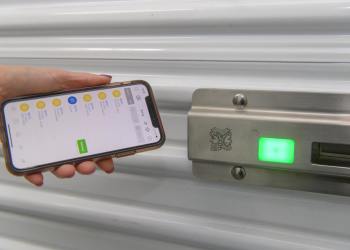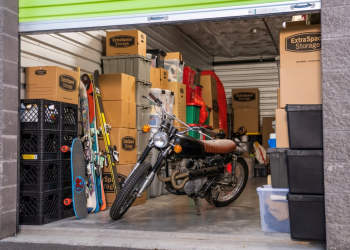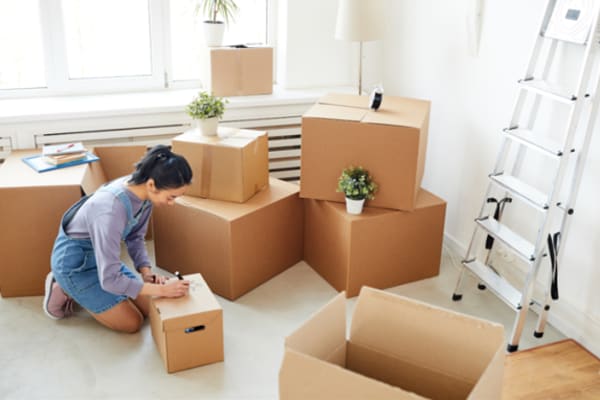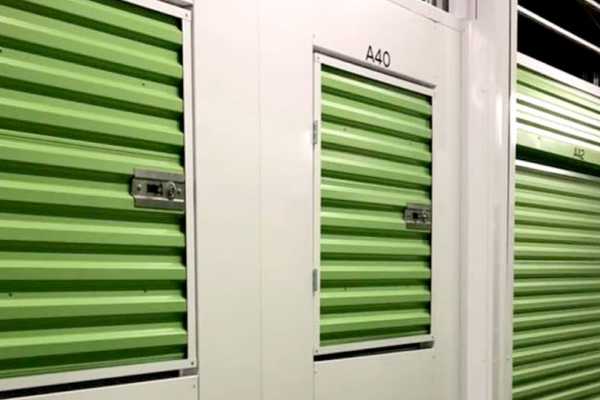- Protection Against Unforeseen Events: While self storage facilities take measures to secure your belongings, they are typically not responsible for damage or loss due to events like fires, floods, theft, or vandalism.
- Coverage Gaps: Your homeowner's or renter's insurance policy may not extend coverage to items stored off-premises, or it may offer limited protection, making additional storage insurance a worthwhile consideration.




modSTORAGE | Self-Storage
modSTORAGE provides secure, convenient self storage in Monterey, California.
Reserve an affordable self-storage unit today!
Benefits of Using Self Storage
Self storage provides a versatile and secure option for managing space and safeguarding belongings, offering numerous benefits for both personal and business use. Here are some key advantages of using self storage:
Flexibility and Convenience
Self storage facilities offer rental agreements on a month-to-month basis, providing the flexibility to store items for as long or as short a period as you need. With various unit sizes available, you can easily upgrade or downsize based on your changing storage requirements.
Enhanced Security Features
Modern self storage facilities are equipped with advanced security measures including 24/7 surveillance cameras, gated access, individual unit alarms, and on-site security personnel, offering peace of mind that your belongings are protected.
Access to Belongings
Many self storage facilities offer extended hours or 24/7 access to your storage unit, ensuring you can reach your items whenever necessary. This is particularly beneficial for businesses that may need to access inventory or equipment at various times.
Cost-Effective
Renting a self storage unit can be more cost-effective than moving to a larger home or office to gain additional space. It provides an economical solution to space management without the long-term commitment of a lease or mortgage.
Reduces Clutter
For both homes and businesses, self storage helps reduce clutter by providing a space to store items that are not needed on a daily basis, creating a more organized and productive environment.
Protects Belongings
Climate-controlled storage options protect sensitive items from damage caused by extreme temperatures or humidity. This is essential for items such as wood furniture, electronics, artwork, and wine.
Facilitates Life Transitions
During significant life transitions, such as moving, downsizing, or welcoming a new family member, self storage offers a temporary space to hold personal belongings until you are ready to sort through them or find them a permanent place in your home.
Business Expansion
For businesses, self storage serves as an offsite extension of the workspace, ideal for storing inventory, seasonal decorations, promotional materials, or records. It allows businesses to expand without the need for larger physical premises.
Self storage presents a flexible, secure, and cost-effective solution for a wide range of storage needs, making it an invaluable resource for individuals and businesses alike. Whether you're facing space constraints, undergoing a transition, or simply need to declutter, self storage facilities provide the space and security you need to manage your belongings efficiently. Small Business
How to Choose a Self Storage Facility
Choosing the right self storage facility is crucial to ensure your belongings are stored safely and accessibly. Here are essential factors to consider when selecting a self storage facility that meets your needs:
Location
- Proximity to your home or business is important for convenience, especially if you anticipate frequent visits to your unit. Consider a facility that's easily accessible from major roads or highways.
Security Features
- Look for facilities with robust security measures such as 24/7 surveillance cameras, gated access, well-lit premises, individual unit alarms, and on-site security personnel. These features provide peace of mind that your items are protected.
Access Hours
- Facilities offer varying access hours. Some provide 24/7 access, while others have restricted hours. Choose a facility that offers access hours that suit your schedule and needs.
Reviews and Reputation
- Research online reviews and ask for recommendations to gauge the facility’s reputation. Customer experiences can provide insights into the facility's management, security, and customer service quality.
Unit Sizes and Types
- Ensure the facility offers a unit size that matches your storage needs. Additionally, consider whether you need a standard unit or a climate-controlled unit based on the items you're storing.
Contract Terms and Conditions
- Review the rental agreement carefully. Understand the terms regarding lease duration, payment schedules, late fees, and policies on unit access and vacating the unit.
Insurance
- Check if the facility requires storage insurance or if your current homeowner's or renter's insurance policy covers items stored off-site. Some facilities offer insurance policies for an additional fee.
Pricing and Special Offers
- Compare pricing and inquire about any special offers, discounts for long-term rentals, or promotions. Be mindful of any additional fees beyond the monthly rent.
Facility Cleanliness and Maintenance
- A well-maintained facility reflects the management's commitment to providing a safe and clean environment for your belongings. Inspect the facility in person, if possible, to assess its cleanliness and upkeep.
Customer Service
- Interact with the facility staff to evaluate their responsiveness, helpfulness, and professionalism. Good customer service can make a significant difference, especially if you encounter issues or have questions.
Taking the time to carefully consider these factors can help you choose a self storage facility that offers the security, accessibility, and services you need to confidently store your belonings.
Tips for Packing and Organizing
a Self-Storage Unit
Packing and organizing a self storage unit effectively can maximize space, protect your belongings, and ensure easy access when needed. Here are some practical tips for getting the most out of your self storage experience:
Start with a Plan
- Inventory List: Create a detailed inventory of items you plan to store. This helps in organizing and later locating things.
- Layout Plan: Sketch a rough layout of how you intend to arrange items within the unit, considering the frequency of access needed for each item.
Packing Tips
- Use Quality Materials: Invest in sturdy boxes, bubble wrap, and packing tape to protect your items during storage.
- Label Everything: Clearly label all boxes on multiple sides with their contents. This saves time when searching for specific items.
- Disassemble Furniture: Save space by disassembling furniture such as beds, tables, and shelving units. Keep all hardware in a labeled bag attached to the item or stored in a designated "hardware" box.
Maximize Space
- Vertical Space: Use the full height of the unit by stacking boxes, with the heaviest at the bottom to prevent toppling. Consider using shelving units to organize smaller items and boxes efficiently.
- Fill Furniture: Utilize the storage capacity of dressers, wardrobes, and refrigerators to store smaller items or boxes.
Protect Your Belongings
- Wrap Fragile Items: Use bubble wrap or packing paper for fragile items, and store them in sturdy, well-labeled boxes.
- Cover Furniture: Protect upholstered furniture and mattresses with covers designed for storage use to prevent dust accumulation and damage.
Organize for Access
- Access Aisle: Leave a walkway through the middle of the unit to easily access items at the back without having to move everything around.
- Frequently Used Items: Keep items you'll need to access more frequently near the front of the unit.
Climate Considerations
- Climate Control: If storing sensitive items like electronics, wood furniture, or documents, consider renting a climate-controlled unit to protect against temperature and humidity damage.
Safety Measures
- Heavy Items on Bottom: Always stack heavier boxes on the bottom and lighter ones on top to prevent injuries and damage to your belongings.
- Securely Pack and Stack: Ensure boxes are securely packed and closed, and stacks are stable to prevent accidents.
By following these packing and organizing tips, you can ensure your self storage unit is used efficiently, keeping your belongings safe, accessible, and in good condition for the duration of their storage.
Climate-Controlled Storage:
Why Do You Need It?
Deciding whether you need a climate-controlled storage unit depends on several factors, including the types of items you're storing, the climate in your area, and the duration of storage. Climate-controlled units maintain a consistent temperature and humidity level, offering protection against damage from extreme temperatures, humidity, and the resultant mold or mildew. Here’s how to determine if climate control is necessary for your storage needs:
Benefits of Climate-Controlled Storage
- Protection from Extreme Temperatures: If your area experiences high heat, freezing temperatures, or wide fluctuations, climate control can prevent warping, cracking, and other temperature-related damage to sensitive items.
- Humidity Control: Ideal for preventing mold and mildew, which can affect electronics, wood furniture, musical instruments, and various other items.
- Dust and Pest Reduction: These units are often located inside buildings with sealed and insulated roofs, walls, and floors, which can also help keep out dust and pests.
Types of Items That Benefit from Climate Control
- Wood Furniture: Wood can crack, warp, or rot due to temperature fluctuations and humidity.
- Electronics and Appliances: Sensitive to extreme temperatures and humidity, which can cause malfunction.
- Artwork: Heat and humidity can damage various types of art, from canvases to sculptures.
- Musical Instruments: Prone to damage from humidity and temperature changes, affecting sound quality.
- Important Documents and Books: Can become illegible or moldy in damp, humid conditions.
- Collectibles and Antiques: Often sensitive to environmental conditions and can deteriorate or lose value if not properly stored.
Cost Comparison
- Climate-controlled units typically cost more than standard units due to the additional electricity and equipment needed to maintain stable conditions. Weigh the potential cost of repairing or replacing damaged items against the higher rental cost.
Deciding If You Need Climate Control
- Assess Your Storage Items: Consider the value and replaceability of your items. If they are irreplaceable or of high monetary value and sensitive to environmental conditions, climate control is a wise choice.
- Consider the Climate: If you live in an area with extreme weather conditions or significant humidity, climate control can provide necessary protection.
- Duration of Storage: The longer you plan to store your items, the more you should consider climate control to protect against long-term environmental damage.



Choosing a climate-controlled storage unit is an investment in the preservation of your stored items. If your belongings are sensitive to temperature or humidity, or if you're storing them in a region with extreme weather, a climate-controlled unit can provide peace of mind and prevent potential damage.



Security Features in Self Storage Facilities
The security of your stored belongings is a critical consideration when selecting a self storage facility. Advanced security features not only protect against theft and vandalism but also provide peace of mind. Here’s what to look for in terms of security when choosing a self storage facility:
Surveillance Cameras
High-quality, around-the-clock video surveillance is essential. Cameras should cover all angles of the facility, including entry and exit points, hallways, and ideally, each unit's door.
Gated Access
A secure perimeter with gated access ensures that only authorized individuals can enter the facility. Access should be controlled by individualized codes or electronic keycards, providing a record of who enters and exits.
Individual Unit Alarms
Top-notch facilities offer individual alarms for each storage unit, which trigger in case of unauthorized access attempts. This feature alerts facility staff or a monitoring center immediately.
Well-Lit Premises
Adequate lighting is crucial for security and safety, particularly during evening hours. Ensure that the facility is well-lit in all areas, including parking lots, hallways, and around each unit.
On-Site Security Personnel
The presence of on-site security personnel or a resident manager adds an additional layer of security and quick response to potential issues.
Secure Locks
While tenants typically provide their own locks, some facilities offer high-security lock options or sell them on-site. Disc locks are recommended for their durability and resistance to tampering.
Security Fencing
Perimeter fencing is a fundamental security measure that deters unauthorized entry. Look for tall, sturdy fencing that is difficult to climb or breach.
Fire Safety and Pest Control
While not directly related to theft, comprehensive fire safety systems (including sprinklers and smoke detectors) and regular pest control measures protect your items from other forms of damage.
Evaluating a storage facility's security features is crucial in ensuring that your belongings are stored in a safe environment. Don't hesitate to ask facility managers about their security protocols and any additional measures they take to protect tenants' property. High-quality security features can make a significant difference in choosing the right self storage facility for your needs.
Cost of Renting a Self Storage Unit
The cost of renting a self storage unit can vary widely based on several factors including location, unit size, amenities, and whether the unit is climate-controlled. Understanding these factors can help you budget effectively and find a storage solution that meets your needs without overspending. Here’s a breakdown of what influences the cost of renting a self storage unit and tips for finding the best deal:
Location
- Urban areas typically have higher storage costs due to higher real estate prices. Comparatively, units in suburban or rural areas may be more affordable.
Unit Size
- The size of the storage unit has a direct impact on price. Larger units cost more, so it’s essential to accurately assess how much space you really need to avoid paying for unused space.
Climate Control
- Units with climate control generally cost more than standard units. If you’re storing items sensitive to temperature or humidity, such as electronics or wood furniture, the extra cost can be a worthwhile investment.
Security Features
- Facilities with advanced security features like 24/7 surveillance, individual unit alarms, and gated access may charge more for these added protections.
Accessibility
- Units with more convenient access, such as 24/7 entry or drive-up access, might come at a premium.
Insurance
- Some facilities require renters to purchase insurance as an additional cost. Check if your homeowner's or renter's insurance covers items stored off-premises, or if you need to buy insurance from the storage facility or a third party.
Special Offers
- Many storage facilities run promotions or discounts for new tenants, such as a free first month or discounted rates for prepaying for several months in advance.
Tips for Finding the Best Deals
- Compare Prices: Get quotes from multiple facilities in your area to compare prices and find the best rate.
- Ask About Discounts: Inquire about discounts for long-term rentals, military, students, or seniors.
- Negotiate: Some facilities may be willing to negotiate on price, especially if you commit to a longer rental term.
Understanding the Rental Agreement
- Carefully review the rental agreement to understand the lease terms, payment schedules, and any penalties for late payments or early termination of the lease.
By taking the time to research and compare options, you can find a self storage unit that offers the space, security, and amenities you need at a price that fits your budget. Remember to consider the value of added features like climate control and security against their additional cost to ensure you’re making a cost-effective decision.
Accessing Your Self Storage Unit
Ease of access to your self storage unit is a crucial factor that affects the convenience and usability of the storage space. When selecting a storage facility, consider how and when you'll be able to access your belongings, as this can significantly influence your overall storage experience. Here are important considerations regarding accessing your self storage unit:
Types of Access
- 24/7 Access: Some facilities offer access to your storage unit around the clock, providing the utmost convenience for accessing your belongings anytime you need them. This is particularly beneficial for businesses that may need to access inventory outside of standard business hours.
- Limited Access Hours: Other facilities may limit access to specific hours, typically during the day or early evening. If your schedule is flexible, this may not be an issue, but for those who require after-hours access, it's a critical consideration.
Drive-Up Access vs. Indoor Units
- Drive-Up Access: Units with drive-up access allow you to park directly in front of your unit for easy loading and unloading. This feature is especially useful for heavy or bulky items and can save considerable time and effort.
- Indoor Units: Indoor units, often located within a building, may provide additional protection from the elements and can offer climate-controlled options. However, accessing these units may involve navigating corridors and possibly stairs or elevators, which could be less convenient for some users.
Security and Access Control
- Gated Entry: Many storage facilities feature a gated entry system that requires a code or electronic key for access, enhancing security while potentially limiting access to authorized users only.
- Individual Locks: You'll typically use your own lock and key or a security code for your individual unit, ensuring that you have control over who accesses your belongings.
Facility Policies on Unit Access
- Guest Access: Understand the facility's policy regarding guest access. You may need to provide authorization for others to access your unit, or there may be restrictions on who can enter the storage area.
- Emergency Access: Inquire about procedures for accessing your unit in case of emergencies, including who to contact and any available after-hours support.
Tips for Frequent Access
- If you anticipate needing regular access to your storage unit, consider organizing your space with this in mind. Keep frequently used items near the front and maintain a clear pathway to items stored in the back.
When choosing a self storage facility, evaluate how the access options and policies fit with your needs and lifestyle. Facilities that offer flexible access hours and convenient unit locations can enhance your storage experience, making it easier to manage your stored items as needed.
Self Storage Insurance
Opting for insurance coverage for your belongings in a self storage unit is a critical decision that can provide peace of mind and financial protection. Understanding the basics of self storage insurance, including what it covers and how to obtain it, is key to ensuring your items are protected against potential loss or damage.
- Facility-Provided Insurance: Many self storage facilities offer their own insurance policies that you can purchase when you rent a unit. These policies may cover a range of risks, but it's important to review the terms and coverage limits carefully.
- Homeowner's or Renter's Insurance: Check with your existing insurance provider to see if your policy covers personal property stored in a self storage unit. You may need to adjust your coverage or add a rider to include stored items.
- Third-Party Insurance Providers: If your facility does not offer insurance or if you prefer an alternative, there are insurance companies that specialize in self storage insurance. These policies can often be customized to your specific needs and coverage desires.
- Coverage Limits: Ensure the policy covers the full value of your stored belongings. You may need to provide an inventory list or appraisal for high-value items.
- Deductibles: Understand the deductible amounts and how they may affect your premium and out-of-pocket costs in the event of a claim.
- Exclusions: Familiarize yourself with what is not covered by the policy. Common exclusions might include damage from pests, flooding, or failure to maintain proper packing and storage conditions.
- Discuss options with the storage facility during the rental agreement process. They can often provide immediate coverage options.
- Contact your existing insurance provider to discuss extending your homeowner's or renter's insurance or purchasing additional coverage.
- Research and compare third-party insurance options to find a policy that meets your needs and budget.
Insurance for belongings in a self storage unit adds an extra layer of security, ensuring you're protected against financial loss due to damage or theft. Taking the time to understand your insurance options and selecting the right coverage can safeguard your stored items and provide invaluable peace of mind.
While traditional self storage units provide a versatile and widely used solution for individuals and businesses needing extra space, there are alternative storage options that might better suit specific needs or preferences. Understanding these alternatives can help you make a more informed choice about the best way to store your belongings.
- Convenience: Full-service storage companies offer a more hands-off approach to storage. They typically include pick-up and delivery services, meaning you don’t have to transport your items to and from the storage facility yourself.
- Inventory Management: Many full-service storage providers use online inventory systems, allowing you to keep track of your stored items through photos and itemized lists, and request specific items to be returned as needed.
- Flexibility: Portable storage containers are delivered to your location, where you can pack them at your leisure. Once packed, the container can either be kept on your property or taken to a storage facility.
- Versatile Uses: Ideal for home renovations, moves, or as a temporary storage solution during transitions. Containers vary in size and can be a flexible option for both short-term and long-term storage needs.
- Tailored Service: On-demand storage services provide a modern, app-based approach to storage. Similar to full-service storage, items are picked up from your location, but the focus is on storing individual items or smaller quantities rather than whole units.
- Accessibility: Items can typically be requested back with the tap of an app, offering convenience for those who need occasional access to their stored items without the need for a traditional storage unit.
- Community-Based: Peer-to-peer storage platforms connect individuals needing storage space with others in their community who have space to spare, such as garages, basements, or spare rooms.
- Cost-Effective: This can be a more economical option, with flexible terms negotiated directly between the host and renter. It’s a solution that benefits both parties and promotes a sense of community.
- Assess Your Needs: Consider the amount of storage you need, your budget, and how often you'll need to access your items.
- Consider Convenience vs. Cost: While some alternatives offer greater convenience, they may come at a higher cost. Determine what’s most important for your situation.
- Read Reviews and Policies: Especially for peer-to-peer and on-demand services, it’s crucial to read reviews and understand the terms and insurance policies to ensure your items will be safe and you’re comfortable with the arrangement.
Exploring alternative storage solutions provides the flexibility to find a storage option that fits your unique needs, whether you’re looking for convenience, budget-friendly options, or innovative ways to manage and access your stored items.
Real-Life Uses for Self Storage
Self storage facilities cater to a wide range of needs, offering versatile solutions for individuals, families, and businesses. Here are several real-life scenarios where self storage proves invaluable:
Transitioning Between Homes: For individuals and families moving to a new home, especially when there's a gap between move-out and move-in dates, self storage provides a secure space to store household goods temporarily.
Downsizing: Those looking to downsize can use self storage to keep possessions they're not ready to part with. It offers a way to declutter living spaces without making permanent decisions on certain items.
College Students: Students who need to vacate campus housing during summer breaks can use self storage to keep their belongings close to school, avoiding the need to transport items back and forth from home.
Business Inventory: Small businesses, online retailers, and startups lacking sufficient space for inventory can utilize self storage as an affordable warehouse alternative, keeping stock secure and accessible.
Life Events: Self storage can assist during significant life events, such as marriage, divorce, or the death of a loved one, by providing space to store furniture, personal belongings, or inherited items until decisions can be made about their future.
Seasonal Storage: Seasonal items like holiday decorations, winter gear, or lawn equipment can take up valuable space at home. Self storage offers a convenient way to keep these items out of the way but easily accessible when needed.
Hobby and Recreational Equipment: Outdoor enthusiasts, hobbyists, or collectors who lack space at home for equipment or collections can benefit from the additional space provided by a self storage unit.
Renovations and Remodeling: During home improvement projects, self storage can protect furniture and appliances from dust and damage, providing a temporary home for belongings until the work is completed.
Archive Documents: Businesses required to keep records for extended periods can use self storage to archive documents securely, freeing up valuable office space.
These examples highlight the flexibility and utility of self storage, offering solutions for temporary or long-term storage challenges across various life and business scenarios. Whether for personal use, business operations, or transitional periods, self storage facilities provide a secure, accessible, and convenient option for managing belongings and inventory.
Self Storage FAQ
A: Self storage is a service that offers individuals and businesses rental space in the form of units or lockers for storing possessions. These units come in various sizes and can be rented short-term or long-term.
A: Estimate the volume of items you plan to store and consider any additional space you might need for organization and access. Most facilities offer size guides and virtual tools to help you select the right unit size.
A: Access policies vary by facility. Some offer 24/7 access, while others have specific operating hours. Choose a facility that aligns with your access needs.
A: Many facilities require proof of insurance for stored items. Check if your homeowner's or renter's insurance extends coverage to self storage, or consider purchasing insurance offered by the storage facility or a third-party provider.
A: Security features vary, but most modern facilities are equipped with surveillance cameras, gated access, individual unit alarms, and sometimes on-site management to ensure the safety of your belongings.
A: Prohibited items typically include perishables, flammable or hazardous materials, illegal substances, and live animals. Always check with the facility for a comprehensive list of prohibited items.
A: Costs vary based on unit size, location, amenities, and whether the unit is climate-controlled. Prices can range from $50 to several hundred dollars per month. Compare rates and consider any promotional offers.
A: Many facilities offer vehicle storage options, including outdoor parking spaces and enclosed units suitable for cars, motorcycles, boats, and RVs. Ensure the unit size and facility access accommodate your vehicle.
A: Climate-controlled storage maintains a consistent temperature and humidity level inside the unit, protecting sensitive items from extreme weather conditions. Consider this option if you're storing electronics, wooden furniture, musical instruments, or any items susceptible to temperature and humidity damage.
A: Rental agreements range from month-to-month leases to long-term arrangements. This flexibility allows you to rent for as long as you need, whether it's a few weeks, several months, or indefinitely.
These FAQs cover common inquiries about self storage, helping you navigate the process of selecting and using a storage facility. Remember, policies and services can vary, so it's important to communicate directly with storage providers for specific information related to your storage needs.
The Versatility and Value of Self Storage
Self storage offers a flexible, secure, and convenient solution for a wide range of storage needs, spanning personal life events, business operations, and everything in between. Its versatility makes it an invaluable resource for individuals seeking temporary space during transitions, businesses in need of inventory storage, and hobbyists looking for a place to house their equipment or collections.
Key Takeaways
- Flexibility: With a variety of unit sizes and types, including climate-controlled options, self storage meets diverse needs, providing short-term and long-term storage solutions. Maximizing Space
- Security: Modern facilities are equipped with advanced security features, ensuring that your belongings are kept safe while stored.
- Accessibility: Many storage facilities offer convenient access hours, and some provide 24/7 access, making it easy to retrieve your items on your schedule.
- Cost-Effectiveness: Self storage presents a cost-effective alternative to expanding existing space, allowing you to pay only for the space you need, when you need it.
- Ease of Use: The process of renting and using a self storage unit is straightforward, with facilities offering various amenities and services to enhance the storage experience.
Moving Forward: Whether you're decluttering your home, navigating a move, expanding your business, or simply in need of extra space, self storage provides a solution that is both practical and accessible. It allows you to manage your belongings efficiently, with the peace of mind that comes from knowing they are securely stored yet readily accessible.
Evaluate your storage needs, research your options, and take advantage of the flexibility and convenience offered by self storage. By choosing the right facility and making the most of the space you rent, you can enjoy the numerous benefits that self storage provides.
Self storage continues to evolve, adapting to the changing needs of its users. With the right approach, you can leverage the versatility and value of self storage to simplify your life, enhance your business, or pursue your hobbies without the constraint of limited space. A Guide to Self Storage
